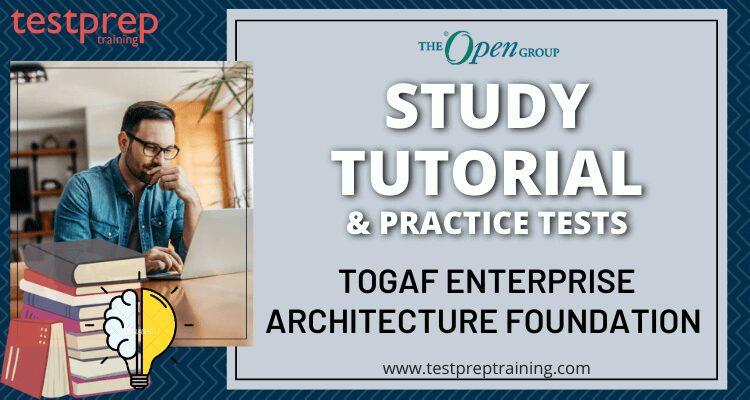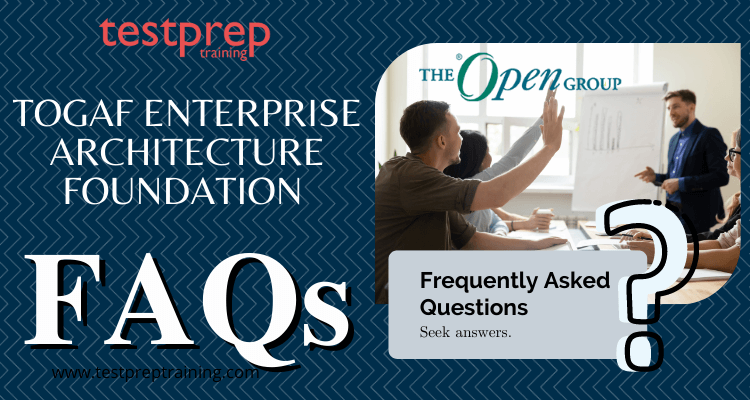TOGAF Enterprise Architecture Foundation

In order to plan, design, implement, and manage Enterprise Architecture, an enterprise uses TOGAF as its framework. In enterprise architecture, there are four distinct domains (data, technology, applications, and business) that heavily rely on products and technologies that are available on the market and are standardized. Earning this certification will prove your skills and demonstrate your understanding of:
- Application of the stakeholder management technique
- Implementation of the Architecture Vision phase including its applicable techniques
- Implementation of the Architecture Development Method (ADM) Phases B, C, and D for developing architecture, along with the applicable techniques
- The fundamental changes in the TOGAF Standard
- The context where an Enterprise Architecture practitioner must operate within
- Implementation of the ADM Phases E, F, and G for implementing an architecture, along with the applicable techniques
- Supporting the ADM work
What Do TOGAF Enterprise Architects Do?
An enterprise architect develops an organization’s long-term information technology strategy, one that supports the business strategy as a whole. In order to lead the organization, they develop IT and application roadmaps based on TOGAF standards for IT infrastructure. Creating a technological flow that runs smoothly from start to finish is the responsibility of the EA.
Target Audience
- The ones who need a basic understanding of the Enterprise Architecture methodology
- Professionals working for an organization applying the TOGAF Standard
- Individuals wanting to learn the TOGAF method
- For people seeking the TOGAF Enterprise Architecture Practitioner qualification in a step-by-step approach, or for those seeking other certifications and certification credentials from The Open Group where the TOGAF Enterprise Architecture Practitioner qualification is a prerequisite.
Prerequisites
The TOGAF Enterprise Architecture Foundation has no specific requirements for taking the certification. Thus, professionals seeking to enter the field of IT architecture will find it easy to pursue it once certified.
Exam Policies
Exam Cancellation Policy
Candidates who wish to cancel their exam must contact Pearson VUE at least 48 hours in advance of their exam appointment, either online through your Pearson VUE account or by telephone. In the event of a cancellation within 48 hours of your appointment or a missed exam, your fee may be forfeited.
Renewal Policy
According to the Open Group Renewal policy, if a candidate has successfully obtained the TOGAF certification then, there is no renewal required.
Exam Rescheduling Policy
The candidate must contact Pearson VUE at least 48 hours prior to their exam appointment if they wish to reschedule their exam. You can reschedule your exam online within your Pearson VUE account or by calling Pearson VUE. If you reschedule an exam within 48 hours of your scheduled appointment or miss your exam, your exam fees may be forfeited.
Retake Policy
It is stated in the Open Group Certification Policy for Examination-Based Programs that candidates failing an examination are not permitted to retake an examination within that Program for a month after they fail it.
For More Information See: TOGAF Enterprise Architecture Foundation FAQs
Course Outline
The TOGAF Enterprise Architecture Foundation exam covers the following topics:
Basic Concepts
The Open Group Reference: III-RM – Basic Concepts
Core Concepts
The Open Group Reference: Core Concepts
Introduction to the ADM
The Open Group Reference: Introduction to the ADM
The Enterprise Continuum and Tools
The Open Group Reference: Enterprise Continuum, Introduction to the Enterprise Continuum
ADM Phases
The Open Group Reference: Introduction to the Architecture Development Method (ADM)
ADM Guidelines and Techniques
The Open Group Reference: ADM Guidelines and Techniques
Architecture Governance
The Open Group Reference: Architecture Governance
Architecture Views, Viewpoints, and Stakeholders
The Open Group Reference: Developing Architecture Views, Architecture Viewpoints, Role of Architecture Views
Building Blocks
The Open Group Reference: Building Blocks, Introduction to Building Blocks
ADM Deliverables
The Open Group Reference: Architecture Deliverables
TOGAF Reference Models
The Open Group Reference: TOGAF Reference Models
Preparation Guide for TOGAF Enterprise Architecture Foundation Exam

The Open Group Virtual Training
The Open Group offers several Virtual classrooms and self-paced training, including those delivered virtually. You can take courses at your own pace and get advice from experts. The Open Group has accredited a number of training programs that provide a variety of courses with a three-hour time frame and multi-day virtual courses to help you prepare for certification exams. Moreover, for the ones who prefer self-study, The Open Group can help you prepare for certification with study guides, study packs, and practice tests.
TOGAF Enterprise Architecture Foundation (Level 1) Online Self-Study Materials
This is a helpful tool for candidates who are preparing to take their exams. This comprehensive study guide includes a syllabus and in-depth coverage and is broken down into a number of chapters, including a brief overview and details on preparing for and taking the exam.
- There are no prerequisites to self-study
- The download file contains instructions for how to access and enroll for the Online Self-Study Materials
- Resources included with the Online Self-Study Materials include downloadable PDF handouts
- The fee includes access to the online version of the Practice Test
- Access to the Online Self-Study Materials is limited to 60 days; you may retain all downloaded files after that time
- Certification is achieved after passing an examination (the examination fees are not included in this product)
TOGAF Accredited Training
Open Group offers accredited training programs for the TOGAF Enterprise Architecture Foundation exam. To find out when and where these courses are being offered, candidates can visit the Open Group website. Candidates can also affiliate to learn about training courses that have been accredited by the organization.
Join the Open Group Work Groups
Working in an environment where members share knowledge, and resources and collaborate on developing open technology standards and certifications is a great way to learn more about a topic of interest. Most Work Groups are open to all members in addition to their Open Group Forum entitlements, and there is no limit to the number of Work Groups members who may join.
Evaluate your preparation with Practice Tests
The best way to reduce mistakes is to practice tests. Practice papers help students learn better, which they can apply to the actual exam. Students should also train their brains by reading and doing as many practice papers as possible. Other than knowledge, there are many factors that can affect your performance in the exam. These include confidence, speed, understanding of the marking scheme, physical and mental alertness and concentration, and more.


